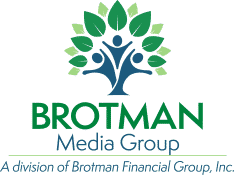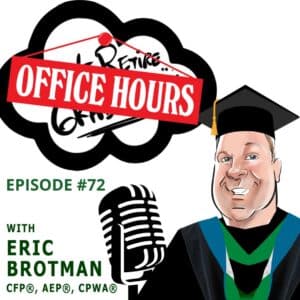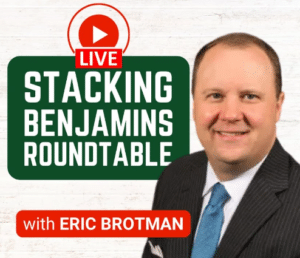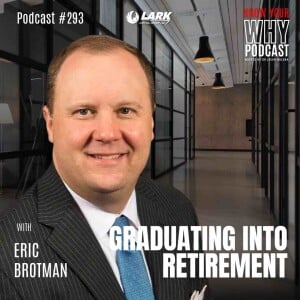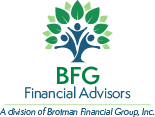This is a great question and understanding the different fee structures for financial advice and when they are appropriate can help you choose your advisor.
Have a question? Post it in the comments, tweet it to us at @BrotmanPlanning, or post it on our Facebook and it may be used in a future episode of Office Hours!
[00:00:00] Eric Brotman: Welcome to Don’t Retire, Graduate- the podcast that asks you what you want to be when you grow up so you can graduate into retirement with purpose and passion. I’m your host and valedictorian, Eric Brotman. Welcome to Office Hours, where we answer listeners questions about personal finance, retirement readiness and more.
[00:00:20] Eric Brotman: We received a question from Morgan who asked, what’s the difference between a fee only and a fee-based financial advisor? And I love this question because so many people do not know the differences and the nuances and the language can be very, very confusing. There are lots of people who call themselves financial advisors who may or may not in fact, maintain certain licenses or certain designations to be that.
[00:00:45] Eric Brotman: So let’s begin with the presumption that all financial advisors are not the same. There is a great variety of financial advisors and types of financial advice. Now, fee only financial advice is advice that is rendered by someone [00:01:00] who will not accept any type of compensation, except that from ongoing management fees, from various from various accounts.
[00:01:08] Eric Brotman: It means that all of the fees paid to the advisor are transparent. They could be in the form of a retainer fee or a monthly planning fee, a subscription type fee. They could be a, a flat, a flat engagement fee. They could be a percentage of assets under management, but only in a managed account where they’re fee only.
[00:01:26] Eric Brotman: Now, I think fee only financial advisors certainly have their place, but I also think that one size doesn’t fit all. So Morgan, not everyone should work with the same type of fee structure because clients and households and situations are very, very different. So what a fee-based financial advisor is, is it’s someone who can be fee only for various clients, and certainly can be in a situation where most, if not all of compensation is on a fee basis.
[00:01:54] Eric Brotman: But there might be scenarios where some times it’s in the best interest of the clients [00:02:00] not to be on a fee basis. So for example, certain types of college savings plans might not allow for a fee-based option. Certain types of annuity vehicles might not allow for a fee uh, for a fee option. Certain types of insurance products and other things might not work in a fee scenario.
[00:02:18] Eric Brotman: So I, I think it’s important to understand that a fee only advisor has one way to charge clients, and it’s purely a fee for service or for asset management. In the fee-based world, there can be a greater variety of ways, and as long as there is transparency and communication and understanding, and, and when I say transparency, I don’t mean disclosure. Disclosures are a disaster. Your disclosure statement for anything could be a hundred pages long. You can’t even download an app on your phone without getting a disclosure that you have to scroll through to accept. And I know you didn’t read it, none of us do. And even if we did read it, we wouldn’t understand it.
[00:02:56] Eric Brotman: And unfortunately, that’s the same way disclosure works in the financial world. [00:03:00] It’s page after page after page of legalese, and it doesn’t make a lot of sense. So when I say transparency, I mean honest, open communication about exactly how your advisor’s being paid by any vendor, by any third party, in addition to whatever you see on your statements.
[00:03:17] Eric Brotman: I don’t think there’s a good or bad way for a financial advisor to charge for services. There really isn’t. Some people think the word commission’s a dirty word. I’m not sure it’s a dirty word. I think when you don’t disclose and, and share and communicate how that works, that it could feel sneaky, but there’s nothing fundamentally wrong with it as long as everyone understands the way it works.
[00:03:38] Eric Brotman: So as a consumer, you may wanna look at fee-based financial advisors. Or you may wanna look at a variety of advisors and figure out whether the fee only relationship works for you. It might and it might not. At BFG, we have some clients who are on a fee only basis with us and others who are not, and it’s based entirely on what the best scenario [00:04:00] is for them.
[00:04:01] Eric Brotman: And we will offer a variety of different ways to do this, but ultimately, it, it comes down to what’s right for the client. So Morgan, your question’s a good one. It is a challenge that the industry faces is how to define compensation. How to disclose compensation, and we talked about disclosures, but as long as you have someone who is in your corner who you can trust, who’s a fiduciary, who’s operating in your best interest at all times, I’m not sure that one compensation method is particularly better than another all of the time. So, I hope I answered your question. It’s a good one. It’s a, it’s a challenge and I, I encourage you to kick the tires for, you know, at a, at a bunch of different advisory locations before you decide which team, which firm, which organization you’re, you’re comfortable with. So great question, Morgan and I, I hope I gave you some clarity.
[00:04:50] Eric Brotman: I thank you for sending it. If you’d like to send us a question we might answer in a future episode of Office Hours, post it on our Facebook page, or tweet us @Brotmanplanning. I’d like to thank all of [00:05:00] you for listening and watching today. We’d love to hear from you, so please send us a message on social media or leave us comments at dontretiregraduate.com.
[00:05:08] Eric Brotman: You can also leave ratings and reviews on your favorite podcast platform. Those are priceless to us. If you enjoy our show, share it with friends and family so they can join you on your journey to financial freedom. We’ll be back next week with an engaging guest and in two weeks with another episode of Office Hours.
[00:05:23] Eric Brotman: For now, this is your host, Eric Brotman, reminding you- don’t retire, graduate. Don’t retire, graduate is part of the Evergreen podcast network.
[00:05:38] Narrator: Securities offered through Kestra Investment Services, LLC. Kestra IS, member FINRA, SIPC. Investment Advisory Services offered through Kestra Advisory Services, LLC. Kestra AS an affiliate of Kestra IS. Kestra IS or Kestra AS are not affiliated with Brotman Financial or any other entity discussed.
